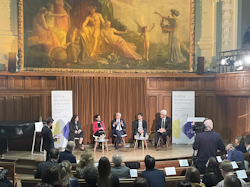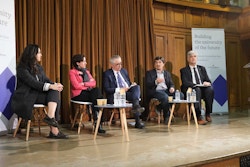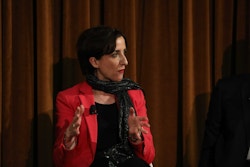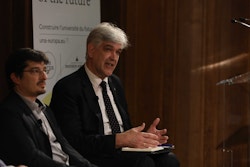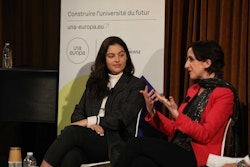On Thursday 16 March students, staff and enthusiastic stakeholders from across Europe came together for a high-level panel discussion on the concept of the joint European degree. This Una Europa Talk, the third iteration of its kind, welcomed a panel of professional, academic and student voices from within and outside the Alliances to exchange views with representatives from the European Commission and Quality Assurance agencies.
Our speakers explored the potential of a joint European degree as an enabler to break down existing bottlenecks in the development and implementation of joint courses and programmes in Europe today, each drawing on their specific experiences. The event took place at L’amphithéâtre Richelieu hosted by Université Paris 1 Panthéon-Sorbonne, a particularly poignant location as it was here that French president Emmanuel Macron first proposed the idea of European Universities in 2017.
" We should be open to rethinking what is a university when we think about what is a European university and a European joint degree. "
Peter Lievens, Vice Rector International and Alumni Policy at KU Leuven and Coordinator of 1Europe Project
Watch the Una Europa Talk now
" Una Europa is about sharing a common vision and common values for the higher education and research. In these troubled times it's important to be together as one. "
Christine Neau-Leduc, Présidente de l’Université Paris 1 Panthéon-Sorbonne
Christine Neau-Leduc, Présidente de l’Université Paris 1 Panthéon-Sorbonne, began the event by welcoming the audience in all the languages of Una Europa, followed by a recorded message on the importance of joint European degrees from Clement Beaune, Secrétaire d’Etat aux Affaires européennes. Una Europa's own Maria Gravari-Barbas shared her personal experience developing the Una Europa joint Doctorate in Cultural Heritage, a flagship programme which acts as a test ground joint European degrees at Doctoral level.
The focal point of the Una Europa Talk was the panel discussion, which featured speakers from all corners of Una Europa as well as representatives from other European University Alliances (EUAs) and key figures in the European Higher Education Landscape, including the European Commission and the High Council for the Evaluation of Research and Higher Education.
Perhaps the most provocative point of the Talk was discussion of the European Commission's proposed 'label' for joint European degrees, introduced into the discussion by Vanessa Debiais-Sainton (Directorate General for Education, Youth, Sport and Culture, European Commission). Debiais-Sainton outlined the purpose of the label as “a certificate that is given to the students on top of your degree” that would act as “a transition until we can give you the European degree as a qualification”. However, the proposed 'label' remains controversial, with much debate over the extent of its efficacy.
" Simplification of European degree can be a real game changer for implementation and to create attractiveness towards European higher education institutions for students. "
Maria Gravari Barbas, PR Université Paris 1 Panthéon-Sorbonne, responsable de la thématique Patrimoine culturel et du Joint doctorat Una Europa
Other highlights from the panel include discussions on how EUAs are developing joint degree programmes - "we continue to build and we aim to deliver only one diploma at one time", stated Antoi Doucet of EU-CONEXUS - and how universities and European agencies must work together to build joint programmes. Thierry Coulhoun said of developing joint European degrees in future, "the next step is to make the European Approach more effective. We need the help of agencies but the universities too in order to do so".
The event ended with a lively Q&A where members of the in-person and online audiences put our speakers to the test, questioning, Can a joint European degree support universities across Europe in their ambition to make joint interdisciplinary education of the future a reality?
Vanessa Debiais-Sainton finished the Talk by reminding everyone of the real drive behind the joint European degree: “Let’s dream big… for the students!”
" We need a European degree that brings the students a common education that is useful and recognised all across Europe. "
Ana Cláudia Camerano, Master's Student at Uniwersytet Jagielloński w Krakowie
Una Europa and the European Commission, pushing for joint European degrees
The European Commission’s recently published higher education package, consisting of a European Strategy for Universities and a Commission Proposal for a Council Recommendation on Building bridges for effective European higher education cooperation, prominently features the work towards a joint European degree that would recognise the value of transnational experiences in higher education and help cut the red tape for delivering joint courses and programmes. The French Presidency of the Council of the European Union is expected to prepare Council Conclusions on the European Strategy for Universities and will also oversee the discussion and eventual adoption of the proposed Council Recommendation.
European University Alliances are key to the ambitious vision of an innovative, globally competitive and attractive European Higher Education Area as flagships for seamless and ambitious transnational cooperation between higher education institutions in Europe. Since their inception, European University Alliances have been leading the way in designing true European interdisciplinary education of the future with the aim of inspiring the transformation of the European higher education sector and beyond.
At Una Europa, we are developing and piloting more than 20 joint interdisciplinary courses and programmes, embedding innovative formats in education and mobility, that have the Una Europa principles of multilingual, multidisciplinary, international and research-based education at the core. The Una Europa Joint Bachelor in European Studies and the Una Europa Joint PhD in Cultural Heritage are particularly far advanced and exemplify the Una Europa way of co-developing an educational environment fit for the Graduates of the Future.
" We certainly need to go beyond the label to achieve a real European degree. But the label is a first step on which all the member states have agreed to build. "
Vanessa Debiais-Sainton, Head of the Unit in charge of Higher Education policies and programme at the European Commission’s Directorate General for Education, Youth, Sport and Culture
Want to know more about the European Degree concept?
The third Una Europa Talk provides a useful introduction and insightful exploration of the concept of the joint European Degree.
Did our panel discussion pique your interest? Find out more about Una Europa's work on the European Degree with our brochure, The transformative power of the European Degree as a quality label
The Una Europa Talk event and format is initiated as part of the 1Europe project, co-funded under Erasmus+.
